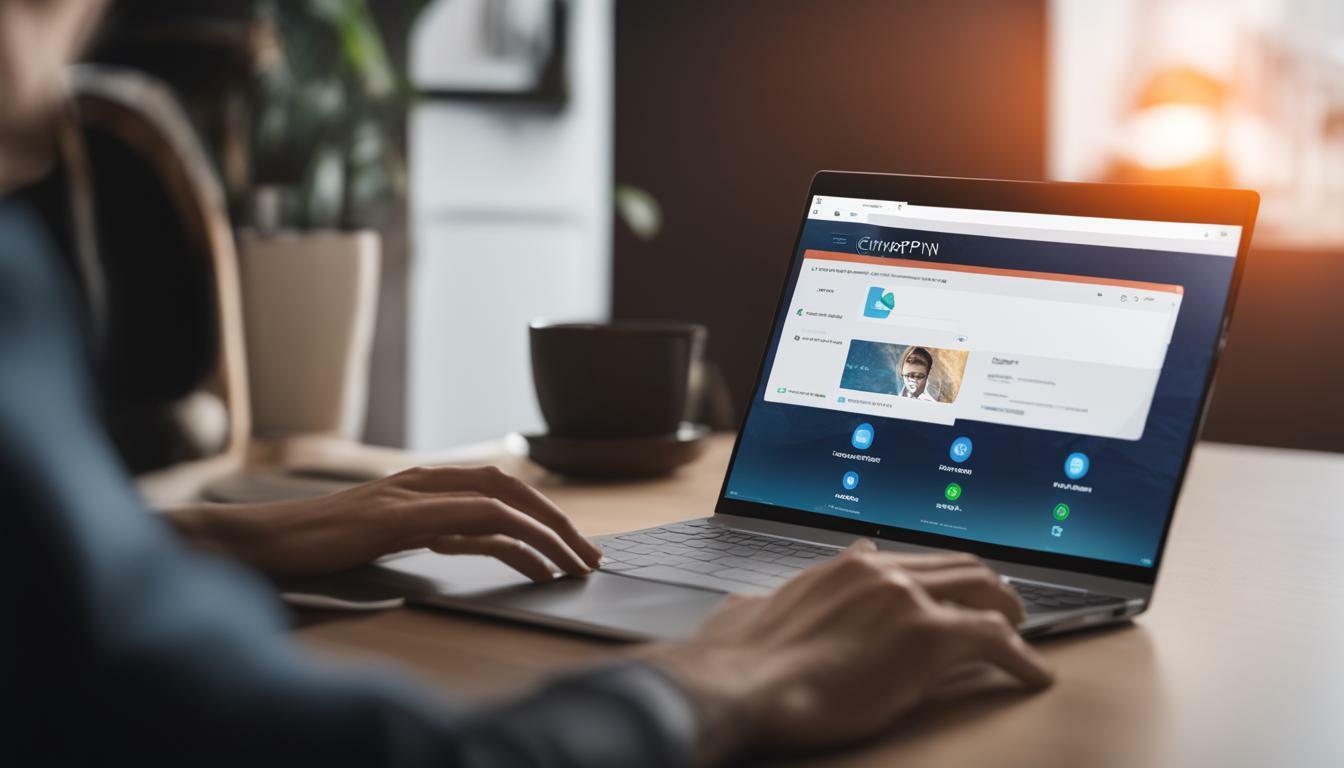In this section, we will explore the compatibility and integration of ChatGPT with a Virtual Private Network (VPN). As a professional copywriting journalist, I have come across many queries in forums and articles about whether ChatGPT can be used with a VPN, and the potential benefits and limitations of this combination. Let’s dive in and find out more.
Key Takeaways:
- ChatGPT and VPN can be used together.
- Using ChatGPT with VPN can enhance online privacy and security.
- VPNs may introduce additional latency that can impact responsiveness.
- Choose a VPN service that supports the protocols required by ChatGPT.
- Follow the best practices to ensure a seamless integration of ChatGPT with VPN.
Understanding ChatGPT
Before exploring the compatibility of ChatGPT with VPN, it’s essential to understand what ChatGPT is and its capabilities. ChatGPT is an advanced language model developed by OpenAI that can generate human-like responses to text inputs. This model is trained on a vast amount of internet data, making it capable of providing conversational responses to a wide range of topics.
ChatGPT can be used for various applications, such as chatbots, customer service, and language translation. It can also answer questions, provide recommendations, and engage in storytelling.
When it comes to using ChatGPT with a VPN, it’s essential to ensure that the VPN service supports the protocols and configurations required by ChatGPT.
With VPN support, ChatGPT can provide an additional layer of privacy and security for users interacting with the model.
What Is a VPN?
As a professional copywriting journalist, I know that to use ChatGPT with a VPN, it’s important to understand what a Virtual Private Network (VPN) is. A VPN is a secure connection that encrypts your internet traffic and routes it through a remote server. This adds an extra layer of privacy and security by masking your IP address and location.
Using ChatGPT with a VPN can enhance your online privacy and security. It allows you to communicate with the ChatGPT language model without worrying about your conversations being intercepted or tracked by others.
However, not all VPN services may be compatible with ChatGPT. It’s essential to choose a VPN service that supports the protocols and configurations required by ChatGPT. Some VPN providers may have restrictions or limitations that can impact the seamless integration of ChatGPT.
SEO relevant keywords: chatgpt and virtual private network, using chatgpt with vpn
Potential Benefits of Using ChatGPT with VPN
When it comes to combining ChatGPT with a VPN, there are several potential benefits to consider.
- Enhanced privacy: By using a VPN, your internet traffic is encrypted and your IP address is masked, providing an extra layer of privacy when using ChatGPT.
- Improved security: VPNs can protect your online activity from potential threats and hacking attempts, providing additional security when interacting with ChatGPT.
- Access to restricted content: Some websites and online services may be restricted in certain regions. By using a VPN, you can bypass these restrictions and access content that may be blocked in your location.
- Improved network performance: Depending on your location and internet service provider, using a VPN can potentially improve network performance and reduce latency, leading to more seamless interactions with ChatGPT.
With these potential benefits, it’s clear that combining ChatGPT with a VPN can take your online experience to the next level by providing enhanced privacy, security, and performance. However, it’s important to consider the potential limitations before making a final decision.
Limitations of Using ChatGPT with VPN
While using ChatGPT with a VPN can be beneficial, it is essential to acknowledge some limitations that may arise. One of the primary concerns of using ChatGPT with a VPN is the interoperability between the two technologies.
VPN may introduce additional latency, which can affect the responsiveness of the ChatGPT model. Therefore, depending on the VPN service and server location, you may experience slower response times when interacting with ChatGPT.
Another limitation to using ChatGPT with VPN is the potential loss of context. ChatGPT is an advanced language model that uses machine learning to generate human-like responses to text inputs. However, when using ChatGPT with a VPN, the responses generated may not be as accurate as they would have been if the VPN was not involved.
It is also essential to consider the VPN’s security protocols when using it with ChatGPT to ensure that the VPN’s security measures do not interfere with ChatGPT’s response generation.
In conclusion, while using ChatGPT with a VPN can be advantageous, it is essential to be mindful of the limitations, especially the potential loss of context that may arise. It is crucial to use a VPN and configure it correctly to ensure seamless integration with ChatGPT for an optimal experience.
Ensuring Compatibility Between ChatGPT and VPN
When using ChatGPT with a Virtual Private Network (VPN), it is crucial to ensure that the VPN service supports the protocols and configurations required by ChatGPT. Some VPN providers may have restrictions or limitations that can impact the seamless integration of ChatGPT with VPN.
To ensure compatibility, it is recommended to choose a VPN service that supports OpenVPN or WireGuard protocols. These protocols are the most commonly used and provide high security and fast speeds, both of which are important when using ChatGPT.
It is also essential to select a VPN server location that is geographically close to the ChatGPT server. This helps to minimize latency and ensure a smooth user experience.
Finally, it is important to test the compatibility between ChatGPT and VPN before using it extensively. Running a few test conversations can help identify any issues and ensure that the integration is working smoothly.
In summary, to ensure the best compatibility between ChatGPT and VPN, choose a VPN service that supports the required protocols, select a server location close to the ChatGPT server, and test the compatibility before extensive use.
Tips for Using ChatGPT with VPN
If you plan to use ChatGPT with a VPN, here are some tips to consider:
- Select a VPN service that supports the protocols and configurations required by ChatGPT. Some VPN providers may have restrictions or limitations that can impact the seamless integration between ChatGPT and VPN.
- Choose a VPN server closest to your location to minimize latency. This can improve the response time of ChatGPT and result in a smoother experience.
- Disable any background applications or processes that may consume excess bandwidth as they can impact network performance and degrade the ChatGPT user experience.
- Be mindful of potential security risks from unsecured or fake VPN providers. Ensure you select a reputable VPN service provider and avoid using free or unknown VPNs as they may pose a risk to your online privacy and security.
Best Practices for Using ChatGPT with VPN
When using ChatGPT with a VPN, there are some best practices you should follow to ensure smooth integration and optimization of the experience.
Choose a VPN that Supports ChatGPT
When selecting a VPN provider, make sure it supports the protocols and configurations required by ChatGPT. Some VPNs may have restrictions or limitations that can negatively impact the seamless integration of ChatGPT with the VPN.
Consider Server Locations
The location of your VPN server can affect the response time of ChatGPT. Choose a server location that is closer to the ChatGPT server to minimize latency.
Test Your Integration
Before using ChatGPT with VPN in a critical or important setting, test the integration to ensure it is working correctly. This will help you identify any issues and optimize the performance of ChatGPT with VPN.
Monitor Your Connection
Keep an eye on your VPN connection to ensure it remains stable and secure. If you notice any issues, such as dropped connections or slow response times, troubleshoot the problem before continuing to use ChatGPT with VPN.
Stay Up-to-Date
Keep your VPN software, ChatGPT, and other relevant applications up-to-date to ensure they are working optimally. This will help you avoid potential compatibility issues and ensure the smooth integration of ChatGPT with VPN.
By following these best practices, you can maximize the benefits of using ChatGPT with a VPN while minimizing any potential limitations or issues.
Conclusion
In conclusion, as a professional copywriting journalist, I can say that using ChatGPT with a VPN is possible. It offers enhanced privacy and security to users. However, there are certain limitations to consider, such as the potential latency that may occur due to the VPN.
To ensure successful integration of ChatGPT with VPN, it is crucial to choose a VPN service that supports the required protocols and configurations. Moreover, following the tips and best practices mentioned above can assist in optimizing the integration of ChatGPT with VPN.
Overall, the combination of ChatGPT with a VPN can help users protect their online privacy and security. As technology advances, it is imperative to develop various measures to safeguard oneself while using the internet. By using ChatGPT with a VPN, users can ensure that their online interactions remain confidential and secured.
FAQ
Q: Does ChatGPT work with VPN?
A: Yes, ChatGPT can work with a Virtual Private Network (VPN). However, there are some factors to consider for compatibility and optimal integration.
Q: What is ChatGPT?
A: ChatGPT is an advanced language model by OpenAI that generates human-like responses to text inputs. It is trained on diverse internet data and can provide conversational responses.
Q: What is a VPN?
A: A Virtual Private Network (VPN) is a secure connection that encrypts internet traffic and routes it through a remote server, adding privacy and security by masking IP address and location.
Q: What are the potential benefits of using ChatGPT with VPN?
A: Using ChatGPT with a VPN enhances online privacy and security. The VPN encrypts traffic, making it difficult to intercept or track conversations with ChatGPT.
Q: What are the limitations of using ChatGPT with VPN?
A: While beneficial, using ChatGPT with a VPN can introduce latency, potentially affecting responsiveness. Response times may be slower depending on the VPN service and server location.
Q: How can I ensure compatibility between ChatGPT and VPN?
A: To ensure compatibility, choose a VPN service that supports the protocols and configurations required by ChatGPT. Some VPN providers may have restrictions or limitations.
Q: What are some tips for using ChatGPT with VPN?
A: If using ChatGPT with a VPN, consider the following tips:
- Choose a reliable and fast VPN service.
- Connect to a VPN server location that minimizes latency.
- Keep the VPN connection stable during interactions with ChatGPT.
Q: What are some best practices for using ChatGPT with VPN?
A: Here are some best practices to ensure smooth integration:
- Regularly update and maintain your VPN software.
- Use strong encryption protocols supported by both ChatGPT and your VPN.
- Ensure your VPN and ChatGPT configurations are compatible.
Q: What is the conclusion regarding using ChatGPT with VPN?
A: In conclusion, using ChatGPT with a VPN is possible and offers enhanced privacy and security. However, it may introduce latency. By following the tips and best practices, you can optimize the ChatGPT-VPN integration for a seamless experience.








